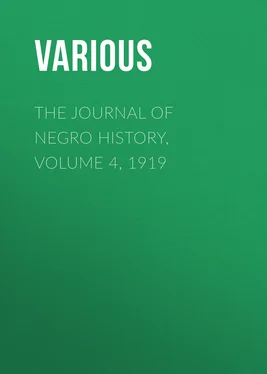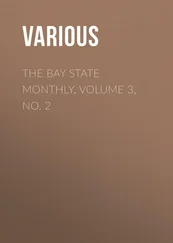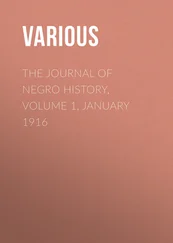Various - The Journal of Negro History, Volume 4, 1919
Здесь есть возможность читать онлайн «Various - The Journal of Negro History, Volume 4, 1919» — ознакомительный отрывок электронной книги совершенно бесплатно, а после прочтения отрывка купить полную версию. В некоторых случаях можно слушать аудио, скачать через торрент в формате fb2 и присутствует краткое содержание. Жанр: foreign_antique, periodic, История, foreign_edu, на английском языке. Описание произведения, (предисловие) а так же отзывы посетителей доступны на портале библиотеки ЛибКат.
- Название:The Journal of Negro History, Volume 4, 1919
- Автор:
- Жанр:
- Год:неизвестен
- ISBN:нет данных
- Рейтинг книги:5 / 5. Голосов: 1
-
Избранное:Добавить в избранное
- Отзывы:
-
Ваша оценка:
- 100
- 1
- 2
- 3
- 4
- 5
The Journal of Negro History, Volume 4, 1919: краткое содержание, описание и аннотация
Предлагаем к чтению аннотацию, описание, краткое содержание или предисловие (зависит от того, что написал сам автор книги «The Journal of Negro History, Volume 4, 1919»). Если вы не нашли необходимую информацию о книге — напишите в комментариях, мы постараемся отыскать её.
The Journal of Negro History, Volume 4, 1919 — читать онлайн ознакомительный отрывок
Ниже представлен текст книги, разбитый по страницам. Система сохранения места последней прочитанной страницы, позволяет с удобством читать онлайн бесплатно книгу «The Journal of Negro History, Volume 4, 1919», без необходимости каждый раз заново искать на чём Вы остановились. Поставьте закладку, и сможете в любой момент перейти на страницу, на которой закончили чтение.
Интервал:
Закладка:
In nine of these parishes where the reign of terror was most prevalent out of 11,604 registered Republican votes only 19 were cast for General Grant. In seven of said parishes there were 7,253 registered Republican votes, but not one was cast at the ensuing election for the Republican ticket.
In the years succeeding 1868, when some restraint was imposed upon political lawlessness and a comparatively peaceful election was held, these same Republican parishes cast from 33,000 to 37,000 Republican votes, thus demonstrating the purpose and the effects of the reign of murder in 1868. In 1876 the spirit of violence and persecution, which in parts of the State had been partially restrained for a time, broke forth again with renewed fury. It was deemed necessary to carry that State for Tilden and Hendricks, and the policy which had proved so successful in 1868 was again invoked and with like results. On the day of general election in 1876 there were in the State of Louisiana 92,996 registered white voters and 115,310 colored, making a Republican majority of the latter of 22,314. The number of white Republicans was far in excess of the number of colored Democrats. It was, therefore, well known that if a fair election should be made the State would go Republican by from twenty-five to forty thousand majority. The policy adopted this time was to select a few of the largest Republican parishes and by terrorism and violence not only obliterate their Republican majorities, but also intimidate the Negroes in the other parishes. The testimony found in our public documents, and records shows that the same system of assassinations, whippings, burnings, and other acts of political persecution of colored citizens which had occurred in 1868 was again repeated in 1876 and with like results.
In fifteen parishes where 17,726 Republicans were registered in 1876 only 5,758 votes were cast for Hayes and Wheeler, and in one of them (East Feliciana), where there were 2,127 Republicans registered, but one Republican vote was cast. By such methods the Republican majority of the State was supposed to have been effectually suppressed and a Democratic victory assured. And because the legally constituted authorities of Louisiana, acting in conformity with law and justice, declined to count some of the parishes thus carried by violence and blood, the Democratic party, both North and South, has ever since complained that it was fraudulently deprived of the fruits of victory, and it now proposes to make this grievance the principal plank in the party platform.
On the 6th of December, 1876, President Grant in a message to Congress transmitted the evidence of these horrible crimes against the colored race, committed in the name and in the interest of the Democracy. They are not mere estimates nor conjectures, but the names of the persons murdered, maimed and whipped, and of the perpetrators of the crimes, the places where they occurred, and the revolting circumstances under which they were committed, are all set forth in detail. This shocking record embraces a period of eight years, from 1868 to 1876, inclusive, and covers ninety-eight pages of fine type, giving an average of about one victim to each line. We have not counted the list, but it is safe to say that it numbers over four thousand.
These crimes did not end in 1876 with the accession of the Democracy to control of the State administration. The witnesses examined by your committee gave numerous instances of like character which occurred in 1878. Madison Parish may serve as an illustration. This parish, which furnished perhaps the largest number of refugees to Kansas, had been exceptionally free from bull-dozing in former years. William Murrell, one of the witnesses called by the committee, states the reasons for the exodus from that parish as follows:
You have not read of any exodus yet as there will be from that section this summer, and the reason for it is that, for the first time since the war in Madison Parish last December, we had bull-dozing there. Armed bodies of men came into the parish—not people who lived in the parish, but men from Ouachita Parish and Richland Parish; and I can name the leader who commanded them. He was a gentleman by the name of Captain Tibbals, of Ouachita Parish, who lives in Monroe, who was noted in the celebrated massacre there in other times. His very name among the colored people is sufficient to intimidate them almost. He came with a crowd of men on the 28th of December into Madison Parish, when all was quiet and peaceable. There was no quarrel, no excitement. We had always elected our tickets in the parish, and we had put Democrats on the ticket in many cases to satisfy them. There were only 238 white voters and about 2,700 colored registered voters.
Mr. Murrell says that David Armstrong, who was president of third ward Republican club, a man who stood high in the community, and against whom no charge was made except that of being a Republican, made the remark:
"What right have these white men to come here from Morehouse Parish, and Richland Parish, and Franklin Parish to interfere with our election?" And some white men heard of it and got a squad by themselves and said, "We'll go down and give that nigger a whipping." So Sunday night, about ten o'clock, they went to his house to take him out and whip him. They saw him run out the back way and fired on him. One in the crowd cried out, "Don't kill him!" "It is too late, now," they said, "he's dead." The Carroll Conservative, a Democratic newspaper, published the whole thing; but the reason they did it was because we had one of their men on our ticket as judge, and they got sore about it, and we beat him. They killed Armstrong and took him three hundred yards to the river, in a sheet, threw him in the river, and left the sheet in the bushes.
Proceeding with the account of that transaction, Mr. Murrell swears that the colored people had heard that the bulldozers were coming from the surrounding parishes, and that he and others called on some of the leading Democrats in order to prevent it, but all in vain. He says:
We waited on Mr. Holmes, the clerk of the court, and we said to him, "Mr. Holmes, it is not necessary to do any bulldozing here; you have the counting machinery all in your hands, and we would rather be counted out than bulldozed; can't we arrange this thing? I made a proposition to him and said, "You know I am renominated on the Republican ticket, but I will get out of the way for any moderate Democrat you may name to save the State and district ticket. We will not vote for your State ticket; you cannot make the colored people vote the State ticket; but if you will let us have our State ticket we will give you the local offices." We offered them the clerk of the court, not the sheriff, and the two representatives. We told him we would not give them the senator, but the district judge and attorney. After this interview Holmes sent us to Dr. Askew, ex-chairman of the Democratic committee, and he said to me, "Now, Murrell, there is no use talking, I advise you to stand from under. When these men get in here we can't control them. We like you well enough and would not like to see you hurt. I will see you to-night at Mr. Holmes." We had an interview with Mr. Holmes and made this proposition, and Holmes asked me this question: "Murrell, you know damned well the niggers in this parish won't vote the Democratic ticket—there is no use to tell me you will give us the clerk of the court, you know the niggers won't do it. You can't trust the niggers in politics; all your eloquence and all the speeches you can make won't make these niggers vote this ticket or what you suggest, even if we was to accept it. No, by God, we are going to carry it. Why," said he, " there is more eloquence in double-barreled shot-guns to convince niggers than there is in forty Ciceros ." I said to him, "Well, do you suppose the merchants and planters will back you up," and he said, "O, by God, they have got nothing to do with it. We have charge of it. We three men, the Democratic committee, have full power to work. "
Читать дальшеИнтервал:
Закладка:
Похожие книги на «The Journal of Negro History, Volume 4, 1919»
Представляем Вашему вниманию похожие книги на «The Journal of Negro History, Volume 4, 1919» списком для выбора. Мы отобрали схожую по названию и смыслу литературу в надежде предоставить читателям больше вариантов отыскать новые, интересные, ещё непрочитанные произведения.
Обсуждение, отзывы о книге «The Journal of Negro History, Volume 4, 1919» и просто собственные мнения читателей. Оставьте ваши комментарии, напишите, что Вы думаете о произведении, его смысле или главных героях. Укажите что конкретно понравилось, а что нет, и почему Вы так считаете.












